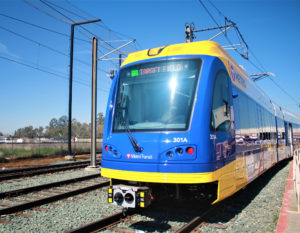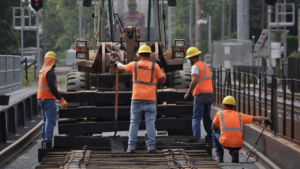Gas boom sparking rail revival
Written by jroodThose who can operate trains, repair locomotives, and maintain railroad tracks may find increased job opportunities in the Lycoming Valley in Pennsylvania soon, the Daily Item reports. Lycoming Valley Railroad Co. is seeing an upsurge in demand for transportation of supplies needed by contractors serving Marcellus Shale drillers.
The processing of drilling
through the shale to extract natural gas, known as hydrofracking, requires lots
of special sand and lots of pipe and it makes lots of wastewater. The sand and
the pipe have to be brought in, sometimes from as far as Saskatchewan, and the
water has to be carted away. Trucks do some of the work, but trains are seeing
an increase in business as well.
Lycoming Valley Railroad
Co.’s first quarter this year showed a 40 percent increase over the same time
period last year, said chairman and CEO Richard Robey. The firm, based in
Northumberland, Pa., hired two more workers and is looking for two more now.
That’s just to start.
The first Marcellus
Shale-linked business south of Interstate 80 that involves rail transportation
is the new Wildcat Co. in Union County. It will serve, for now, drilling
operations to the north. It’s in Union County, according to Lycoming Rail’s
Marketing Director Todd Hunter, because Williamsport ran out of "easy spots" to
locate a freight hub near railroad tracks.
Second-tier suppliers to
Marcellus Shale drillers need access to railways and highways, he said.
Wildcat
is a Colorado-based company, Hunter said, but it has plans to hire from the
local job market.
The firm was unloading its first shipment of sand Friday. It
will be trucked to drilling sites to the north.
Robey said the sand used in
hydrofracking is a "unique commodity" that is brought from locations such as
Illinois, New Jersey and Saskatchewan.
Lycoming Valley Railroad Co. operates
as far as Berwick to the east, State College to the west, Lewistown to the
south and Williamsport to the north, Robey said. Its primary connection is with
the Norfolk Southern Railroad.
The company is also the
contract operator of a railroad owned by the SEDA-COG Joint Railway Authority.
Gas drilling needs may
come just in time to rescue Pennsylvania railroad operations, which have been
experiencing shrinking demand for loads of traditional material, such as coal,
iron and steel.
"We managed to get through
the recession without any layoffs," Robey said. "Today we have 16 new customers
involved in supplying the Marcellus Shale gas industry."
That industry started up in
earnest in Pennsylvania in 2008, Hunter said.
"its impact on local areas
is dramatic," he said. "I live in Williamsport and the changes in Williamsport
are dramatic."
Some of them include more
commerce, influx of population, and higher prices and land values.
"Some are good," Hunter
said. "They’re hiring a lot of people. But, there’s good and bad in everything."
Hunter serves on the
Lycoming County Gas Task Force studying zoning and land issues.
That magnitude
of "boom town" changes have not come to the central Susquehanna Valley, he
said.
According to the Associated Press, Wilkes-Barre has seen an outdated and
barely used rail terminal transformed by a $100,000 facelift bought by the
Reading & Northern Railroad Company. The company plans to invest another
$500,000 in track improvements and material-handling facilities to transport
sand, water and pipe.





